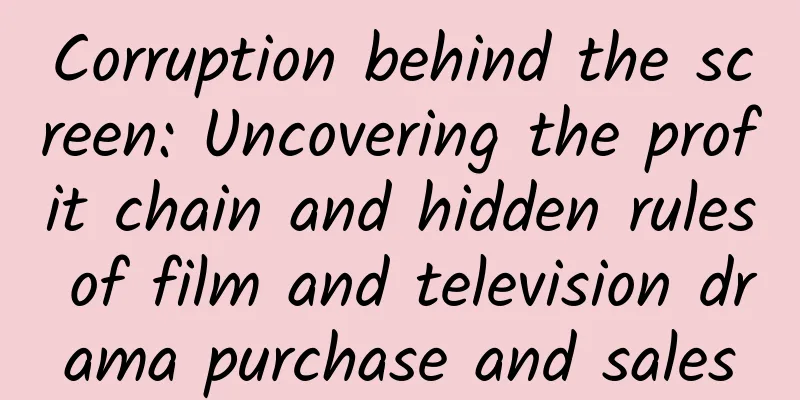Corruption behind the screen: Uncovering the profit chain and hidden rules of film and television drama purchase and sales

|
Crazy bribery, crazy purchase of dramas. A TV station in central China purchased 327 TV dramas from 2011 to 2013, with a total price of 2.4 billion yuan. In order to broadcast such a huge number of TV dramas within the contract period, the satellite channel of the station broadcast more than 10 episodes of TV dramas every day. Even so, by August 2014, there were still 21 TV dramas with a total value of 210 million yuan that had not been broadcast in time, and the inventory backlog was very serious. More than 15,000 episodes. Only 9,000 episodes. The former is the annual output of TV series in China, and the latter is the number of episodes broadcast.A comparison shows that 1/3 of TV dramas may never see the light of day after being filmed. This huge gap has made the purchase and sale of film and television dramas a "huge pit". Since 2014, judicial authorities have successively investigated and dealt with a number of corrupt practices in the purchase and sale of TV dramas: Zhang Suzhou, former director of a TV station in central China, and several of his subordinates were involved in the case; Shi Lianwen, former director of a TV station in the north, realized the lesson after being imprisoned that "if you steal, you will be caught"; a number of bribers and film and television companies were sentenced for corporate bribery. What kind of a "pit" is the purchase and sale of TV dramas, and why does it breed such serious corruption? corruption Film and television companies try their best to sell dramas, and supply exceeds demand. Buyers are in a strong position, and power has room for rent-seeking. The television industry has always been a fierce battlefield, and the most intense fighting is in TV dramas. Do you know how many TV series are produced in my country each year? According to the Global TV Series Industry Development Report (2016), in 2015, the number was 21,546 episodes and 773 TV series (including the online video market). Behind the exciting figures lies an embarrassing reality. Even as the world's largest TV drama broadcasting country, my country's TV drama broadcasting number still cannot keep up with production. Oversupply has become a common phenomenon, and film and television companies are trying their best to sell dramas. Industry insiders give an example, saying that there was a period of time when banks did not provide loans to film and television companies because TV drama projects were too risky and could not be mortgaged. If the films were not sold, no money would be returned. But the broadcast capacity of TV stations is limited. A senior industry insider told Nandu reporters that in the past five years, the annual output of TV dramas in my country has remained between 15,000 and 19,000 episodes, but the total number of TV dramas broadcast by the four-level TV stations in the country (central TV, provincial TV, municipal TV and county TV) is about 9,000 episodes. CCTV focuses on news, sports and feature films, and rarely spends a high price to buy TV dramas. Provincial satellite TV stations with strong purchasing power regard TV dramas as the main battlefield for ratings. "The reality is that the supply of TV dramas far exceeds the demand," said the industry insider. The low production and sales rate, the large number of works but few high-quality ones, and the relatively limited distribution channels have become the real problems in the purchase and sale of TV dramas. The supply and demand relationship is seriously unbalanced, and the buyer is in a strong position - power has room for rent-seeking, and "unwritten rules" have quietly formed. Industry insiders revealed that TV series are mass cultural products, and their special attributes cannot be evaluated by tangible criteria. There is no quantitative standard, so TV stations have a lot of autonomy when buying TV series. Generally speaking, each TV station has a different positioning, and will collect industry information and purchase TV series that meet the needs of the station, such as Hunan Satellite TV's positioning is youth, and Dragon TV's positioning is urban fashion. The TV station will list a detailed film review form based on factors such as the audience group and broadcast positioning, which will include detailed items such as the cast and theme content. Based on these contents, the staff will score and select the TV series to be purchased. Due to the lack of specific quantitative indicators, there are various opaque aspects in the purchase and sales process, and the decision-making power of the purchaser is concentrated in the hands of a few people, who have become the key "public relations" targets of film and television companies. The purchase and sale of TV dramas, along with project construction and advertising, are considered by the industry to be the three major corruption-stricken areas in the radio and television system. Jiangsu Province once sent a special research group on film and television product procurement to investigate the purchase and sale of film and television dramas throughout the province, and summarized the violations of discipline and law that are easy to occur in the purchase of film and television dramas, including: First, kickbacks (also known as rebates). The so-called kickbacks in the purchase of films refer to the process of film and television drama sales. In order to maintain a close business relationship with the specific person in charge of the buyer and ensure long-term cooperation between the two parties, the seller takes out a certain proportion of the profits that already belong to him and gives it to the buyer. The buyer secretly receives cash from the seller off the books. The second is to receive labor fees in disguise. That is, the seller allows the buyer's personnel to be named in the film and television production cooperation as producers, directors, supervisors, etc., without participating in any filming work, and "legitimately" receive high labor fees. The third is disguised "shareholding dividends". The buyer and seller privately reach an agreement, and the buyer's leaders and film purchasing personnel "buy shares" in the production of the seller's film and television drama in their personal names in exchange for future orders of the seller's film and television drama, and "legitimately" obtain high "dividend profits". Fourth, accepting high-end gifts. The seller invites the buyer's relevant personnel to participate in various celebrations and gives them high-end gifts to win over relevant personnel in order to achieve the purpose in the process of film and television drama purchase and sales; Fifth, disguised consumption-type kickbacks. The seller provides the buyer's personnel with various welfare consumption such as domestic and foreign travel and inspection under various names; Sixth, accepting banquets. This phenomenon is quite common. In order to strengthen the emotional connection with the buyer, the seller regularly or irregularly entertains the buyer's leaders or relevant personnel and provides high-end consumption. crazy Crazy bribery, crazy purchase of dramas. A provincial TV station once had a "rotten stock" because of too many dramas purchased. "Collapsing corruption" - this is how Zhang Suzhou once described the "corruption crisis" in the province's radio and television system. On February 4 last year, Zhang Suzhou was arrested by the procuratorate for bribery. He was suspected of embezzlement and bribery, with the total amount involved exceeding RMB 16 million. The indictment shows that the people who gave him money were mainly senior executives of advertising, TV drama and large program production companies, middle and senior cadres and employees of the provincial radio and television, and well-known domestic singers and actors. The bribers targeted Zhang Suzhou's high decision-making power in advertising operations, TV drama and program purchases and sales, personnel adjustments, and many other aspects as the station director. The public prosecutor determined that 30 companies and individuals had given cash and items to Zhang Suzhou. The company with the largest amount of money involved was Rijingsheng Consulting Company, whose chairman Cheng Jing was a classmate of Zhao Hongmei, Zhang's deputy and deputy director of the provincial radio and television station. From 2011 to 2013, Cheng Jing gave Zhang Suzhou a total of 4.14 million yuan and a Patek Philippe watch worth 123,900 yuan on 14 occasions. Wu, the president of Shanghai Keton Culture Media Co., Ltd. (hereinafter referred to as "Keton Media"), was also one of the money givers. Wu and Zhang Suzhou were old acquaintances. He was once the deputy director of a TV station and founded Keton Media in 2003. To the audience, Wu is more familiar with the TV series "Why Sheng Xiaomo" and "Love Apartment" produced by his subsidiary. From 2007 to 2013, Wu bribed Zhang Suzhou, Zhao Hongmei and Xiao Rong, the former director of the editorial office, a total of 3.42 million yuan and 4,000 US dollars. Zhang Suzhou still remembers the first time Wu gave him 20,000 yuan in cash. "In 2007, when I was attending a TV festival in Shanghai, Wu gave me 20,000 yuan in cash, which marked the beginning of my acceptance of large bribes." The second time Wu gave money to Zhang Suzhou was during the 2008 Shanghai TV Festival, with an amount of 50,000 yuan. After that, Wu would visit Zhang's home every Spring Festival to "greet the New Year" and give him "holiday money" ranging from 100,000 to 500,000 yuan; in the summer of 2009, Zhang Suzhou accepted 300,000 yuan from Wu in his office. The court verdict determined that Anhui TV would purchase two or three TV series from Wu's company every year. The turnover was more than 60 million yuan. The court ruled in December last year that Wu and Kedun Media bribed state officials in order to seek improper benefits. This constituted the crime of "unit bribery" and was fined 3.4 million yuan. Wu was sentenced to three years in prison with a five-year reprieve. The Zhang Suzhou case has not yet been publicly sentenced. Also investigated along with Zhang Suzhou was Xiao Rong, the former director of the editorial office. As he was in charge of the outsourcing of TV programs and financial approval, Xiao Rong illegally accepted bribes from many film and television companies and related personnel on many occasions, totaling 5.41 million yuan in cash and 9 gold bars. In return, Xiao Rong promised or directly provided assistance to the briber in terms of TV drama procurement and payment approval. The witness stated in his testimony that he gave money to Xiao because he was the director of the editorial office and was responsible for reviewing TV drama procurement, and Xiao's signature was also required for payment. His company was able to sell many TV dramas to the satellite TV station and establish a long-term cooperative relationship, which was inseparable from Xiao Rong's care. A reporter from Nandu saw in the verdict that in addition to Croton Media, Xiao Rong also accepted kickbacks from more than a dozen companies, including Beijing Yahuan Audio and Video Production Company, Shanghai No. 3 Cultural Communication Co., Ltd., Beijing Huasheng Jinbang International Media Co., Ltd., Suzhou Funa Cultural Technology Co., Ltd., Hairun Film and Television Company, and Dongyang Zijun Occasion Film and Television Culture Media Co., Ltd., and provided assistance in purchasing TV series such as "Detective Investigation Files B", "Paradise Show", "Splendid Pig Bajie", "Luoguxiang", "The Tearful Bride", "Beauty's Rival in Palace", and "Beauty in the Palace", as well as in payment. A briber said that the current TV drama market is very competitive. If you want to sell TV dramas, you need to get the attention of the relevant personnel of the TV station. Xiao has certain power in TV drama procurement and payment. When the company was selling TV dramas to the satellite TV station, Xiao helped a lot in film review and payment. He was very grateful to him. However, the "gratitude" of the bribers eventually sent Xiao Rong to prison. Xiao Rong was sentenced to nine years in prison for the crime of accepting bribes. The deputy director of the program purchase and sales center naturally also has to share a share of the TV series purchase and sales. Zhang Wenxu, the former deputy director of the program purchase and sales center of the editorial office of the TV station, handled the purchase of the TV series "Reunion" produced and distributed by Fujian Century Changlong Film and Television Co., Ltd. Chen, the distributor of Century Changlong, gave Zhang Wenxu a 5% kickback on the purchase price. The payment details issued by the TV station show that the total price of the TV series "Reunion" is 24.016 million yuan, and Zhang received a kickback of 1.2 million yuan. In addition to another TV series "My Mom is an Angel" sold by Century Changlong to the TV station, Zhang Wenxu received a total of 1.45 million yuan in bribes. In the end, Chen and Century Changlong were convicted of corporate bribery, and Chen was sentenced to one and a half years in prison with a two-year reprieve. Crazy bribery, crazy purchase of dramas. Investigators found that the TV station's purchase of dramas in recent years has obviously exceeded actual demand. According to statistics, the station purchased 327 dramas from 2011 to 2013, with a total price of 2.4 billion yuan. In order to broadcast such a huge number of dramas within the contract period, the satellite channel of the station broadcasts more than 10 episodes of dramas every day. Even so, by August 2014, there were still 21 dramas with a total value of 210 million yuan that had not been broadcast in time, and the inventory backlog was very serious. Industry insiders told Nandu reporters that a satellite TV station in central China that was involved in a bribery scandal once created a "miracle" among satellite TV stations. It established itself as a station based on dramas, and made the purchase and arrangement of TV dramas a strategic priority. It has developed rapidly since the 1990s. As a provincial TV station in central China, the TV drama purchase volume of this satellite TV station once ranked among the top three provincial satellite TV stations, even surpassing its more affluent neighboring stations. Due to the huge demand for TV dramas, major film and television companies came to the station one after another to show off their skills, which is also the reason why the satellite TV station was involved in a bribery scandal due to the purchase of dramas. The relevant person in charge of the Anti-Corruption Bureau of the Procuratorate handling this case once told the media that corruption is prominent in the drama purchasing process, with hundreds of thousands or even millions of yuan being given in one gift. The station director, the director, and the person in charge of the liaison also have to give gifts. "In response to this problem, we proposed how to make the drama purchasing process open and adopt a bidding form to avoid the problem of certain people having the final say." "Betting" When many TV stations sign purchase contracts with film and television companies, they will attach a "betting agreement", which means that they must make a ratings guarantee. Zhang Suzhou's case is not an isolated one. On July 21, 2014, Shi Lianwen, the former director of a northern provincial radio and television station, was sentenced to life imprisonment for the crimes of accepting bribes and embezzling public funds, deprived of political rights for life, and confiscated all personal property. Using the power to decide on the ordering of TV series, Shi Lianwen accepted bribes of RMB 5.71 million and HKD 200,000 from producers and distributors. After receiving 4.3 million yuan in bribes, he "took care" of a company to promote its own film to the TV station for broadcast; when most people in the film review team raised objections, he still instructed to spend 20.41 million yuan to buy a TV series; the TV station bought the TV series at 350,000 yuan per episode in the first round of prime time, and the price of the TV series sold to other satellite TV stations at the same time was only 20,000 yuan per episode. The TV series that Shi Lianwen bought with special "care" may not be well received by the audience and the market. One TV series was only aired for three episodes before it was suspended because the ratings did not meet the target. Ratings are the sword of Damocles hanging over the heads of TV drama buyers. The core of TV station competition is the competition for ratings, and behind it is the competition for interests. Only when the ratings go up can we attract "money sponsors" advertisers. According to statistics, more than 80% of the annual income of TV stations in China comes from advertising sales. For TV stations, only by increasing the ratings can advertising revenue increase. For advertisers, apart from those TV dramas and programs that have become phenomenal, the most important criterion for them to evaluate the value of their advertising is the ratings, and there is no other way. However, TV dramas are bought based on "expectations". Before a TV drama is broadcast, even the most experienced industry insiders are not sure whether it will be a hit or a box office flop. This is one of the reasons why it is difficult to quantify indicators in the TV drama purchase and sales industry. Industry insiders told Nandu reporters that even if they encounter "fatal" ratings assessments, TV stations have a response and they pass the risk to the film and television companies through "betting". When many TV stations sign TV drama purchase contracts with film and television companies, they will attach a "betting agreement". That is, when selling a drama, the producer must make a ratings guarantee to the TV station - the drama must reach the ratings guaranteed in the agreement when it is broadcast, and the seller can get the full purchase money from the TV station. Otherwise, the corresponding money will be deducted according to the agreed proportion. For example, a TV series has a price of 1 million yuan per episode when the rating reaches 1%. If the rating drops by 0.1, the TV station will deduct 100,000 yuan from the purchase fee for each episode. If the final rating is only 0.9%, the price per episode will drop to 900,000 yuan. If the rating reaches 1.2, the price per episode will rise to 1.2 million yuan. According to industry insiders, there are only about 20 TV series with a national rating of more than 1% in a year, and they are all concentrated in a few first-tier satellite TV stations, with prices exceeding one million per episode (between 1 million and 3 million). Data from CCTV Sofres shows that among the TV series broadcast on satellite TV last year, 70% of them had an average rating of less than 0.5%, which is the passing line. Industry insiders said that in order to collect the full payment for the TV series, the film and television companies will inevitably try every means to increase the ratings of the TV series, which leads to the phenomenon of falsifying ratings. In recent years, during the National People's Congress and the Chinese People's Political Consultative Conference, the phenomenon of falsifying ratings of TV series and TV series has been frequently "blasted" by representatives and committee members. Nandu reporters noticed that the official website of the State Administration of Press, Publication, Radio, Film and Television posted a letter signed by provincial TV stations across the country in June this year, "Abiding by Media Social Responsibility and Opposing Ratings-Only Self-Discipline Pact", which states that no clauses that set prices or bargain prices based on ratings or ratings rankings should be signed in TV drama purchase and sales contracts. CCTV, China Education Television and provincial TV stations across the country jointly signed it. compete Video websites have brought great changes to the TV drama industry. The strong bargaining power of TV stations in the purchase and sale of TV dramas is facing challenges. The risks in purchasing and selling TV dramas have seriously restricted the development of the industry. The 2015 financial report released by listed company Tangde Film and Television lists various risks of film and television products, including "marketability risks of film and television dramas, regulatory policy risks, work review risks, risks affected by the 'one drama, two stars' policy, etc." Industry insiders told Nandu reporters that with the improvement of the national legal system and the development of the industry, the role of "public relations" in the purchase and sale of film and television dramas is becoming smaller and smaller, and the industry's "unwritten rules" are also being gradually purified. Another phenomenon worth noting is that in addition to TV stations, there are now online video broadcasting platforms, which is a welcome phenomenon after full market competition. Observers said that video websites have brought great changes to the TV drama industry, and the strong bargaining power of TV stations in the past in TV drama purchases and sales is facing challenges. Nowadays, TV drama copyrights are no longer limited to TV copyrights, but also include online copyrights. In just a few years, the price of online copyrights for a TV drama episode has quickly jumped from a few thousand yuan to several million yuan. The most popular TV series in 2012, "The Legend of Zhen Huan", had a TV copyright of 950,000 yuan per episode, while the online copyright was 250,000 yuan; in 2014, the TV copyright of "The Empress of China" sold for 3.38 million yuan per episode, while the online copyright was 820,000 yuan; subsequently, the online copyright prices also rose, with the TV copyright of "Nirvana in Fire" selling for 3.35 million yuan per episode, and the online copyright selling for 1.45 million yuan per episode; the TV copyright of "The Legend of Miyue" selling for 6.2 million yuan per episode, and the online copyright selling for 1.9 million yuan; the copyright of the newly launched new drama "Ruyi's Royal Love in the Palace" has already been sold, with the TV copyright selling for 6 million yuan and the online copyright selling for as much as 9 million yuan, a phenomenon of inverted prices. The increasingly popular online video platforms have started a new battle for content copyrights. It is against this background that more and more film and television companies have proposed to create "all-network dramas" and turn to the Internet. According to the relevant data of the "Global TV Drama Industry Development Report (2016)", in 2015, 66.5% of the total number of TV dramas broadcast in my country - a total of 262 dramas and 10,013 episodes - were broadcast through online video media; there are 8 large video websites in my country with more than 1,000 dramas on air; in 2015, the production of online self-made dramas has experienced a "blowout", with the output increasing from 205 in the previous year to 379, an increase of 85%. While video websites are entering a fierce competition, the websites' voice and influence in the TV drama industry are also increasing, and TV stations are no longer the only broadcasting platform for TV dramas. In addition, relevant national departments have also strengthened supervision over the purchase and sale of TV dramas. Li Qiufang, who once served as the head of the Central Commission for Discipline Inspection's Discipline Inspection Group at the State Administration of Press, Publication, Radio, Film and Television, once pointed out the "hidden rules" in the film and television industry and other fields. He said that he would conduct an in-depth investigation on this basis and formulate a restraint mechanism at the same time. Many domestic TV stations have noticed the corruption problems in the purchase and sale of TV dramas, and many satellite TV stations have strengthened supervision over procurement departments and procurement personnel. On August 29, the Party Leadership Group of the State Administration of Press, Publication, Radio, Film and Television emphasized the need to strengthen the prevention and control of corruption risks in key areas when reporting on the rectification work of the inspection. In particular, it is necessary to combat the use of decision-making power and pricing power in the publication, production and broadcasting of film and television programs to seek improper benefits. It also reported that it is currently conducting a comprehensive investigation based on the clues of the problem transferred by the Commission for Discipline Inspection, and once violations of discipline are found, they will be resolutely and seriously investigated. Just like the fraudulent box office of movies, the fraudulent purchase and sale of TV dramas and the fraudulent ratings have always been criticized. Some media quoted Wang Yong, chairman of Shaanxi Cultural Investment Group, as saying, "my country's TV drama industry is more like a circle, rather than a mature industrial market." With the in-depth advancement of anti-corruption work and the development of the market, my country's TV drama "circle" will sooner or later be completely broken, and the TV drama industry is entering an unprecedented period of great development. As a winner of Toutiao's Qingyun Plan and Baijiahao's Bai+ Plan, the 2019 Baidu Digital Author of the Year, the Baijiahao's Most Popular Author in the Technology Field, the 2019 Sogou Technology and Culture Author, and the 2021 Baijiahao Quarterly Influential Creator, he has won many awards, including the 2013 Sohu Best Industry Media Person, the 2015 China New Media Entrepreneurship Competition Beijing Third Place, the 2015 Guangmang Experience Award, the 2015 China New Media Entrepreneurship Competition Finals Third Place, and the 2018 Baidu Dynamic Annual Powerful Celebrity. |
>>: Samsung Note 7 explosion: It's like walking on a towering building
Recommend
How to reduce carbon emissions in buildings? Tracking the carbon footprint of buildings
Produced by: China Construction Fifth Engineering...
Jack Dorsey: Apple Pay is a great experience, Square will fully support it in 2015
[[123142]] According to CNN, Square plans to supp...
Where does the back of the belly button lead to?
Follow "Body Code Decoding Bureau" (pub...
Snatching cell phones, picking backpacks... There are more conflicts between monkeys and humans, and it’s not just the monkeys’ fault
"Attention, tourists! If you bring glasses, ...
What are the advantages of server hosting compared to virtual hosting?
There are five major advantages of server hosting...
Hawking passed away. How do brands use copywriting to commemorate his greatness?
When I was very young, I learned about the scient...
Android can't conquer TV games? Who else can promote home entertainment?
In the past two years, the trend of smart TVs has...
Cocoa prices double! Will we still be able to afford chocolate in the future?
Recently, foreign netizens who love chocolate dis...
Top 10 tools every Android developer should know
[[139581]] The Android operating system released ...
Can you pick the dirt in your belly button? Don't pick it randomly, beware of 4 hidden dangers
The son likes to play with his father. When he is...
Look at the product growth of WeChat Reading through the AARRR growth model!
As we enter the second half of the mobile Interne...
How many eggs should you eat every day? Experts: It depends on how much the eggs affect your blood lipids!
Two of my patients with hyperlipidemia, The test ...
Are the bigger the mosquito bite, the more toxic it is? The truth is…
In addition to the high temperature in summer, mo...
Global smartphone sales decline as Apple surpasses Xiaomi
[[432650]] According to preliminary data from the...
Brother Qihang: Douyin brings goods: One person makes 300 videos a day and easily earns more than 100,000 yuan a month with advanced violent gameplay
So if you want to succeed, you must keep learning...









